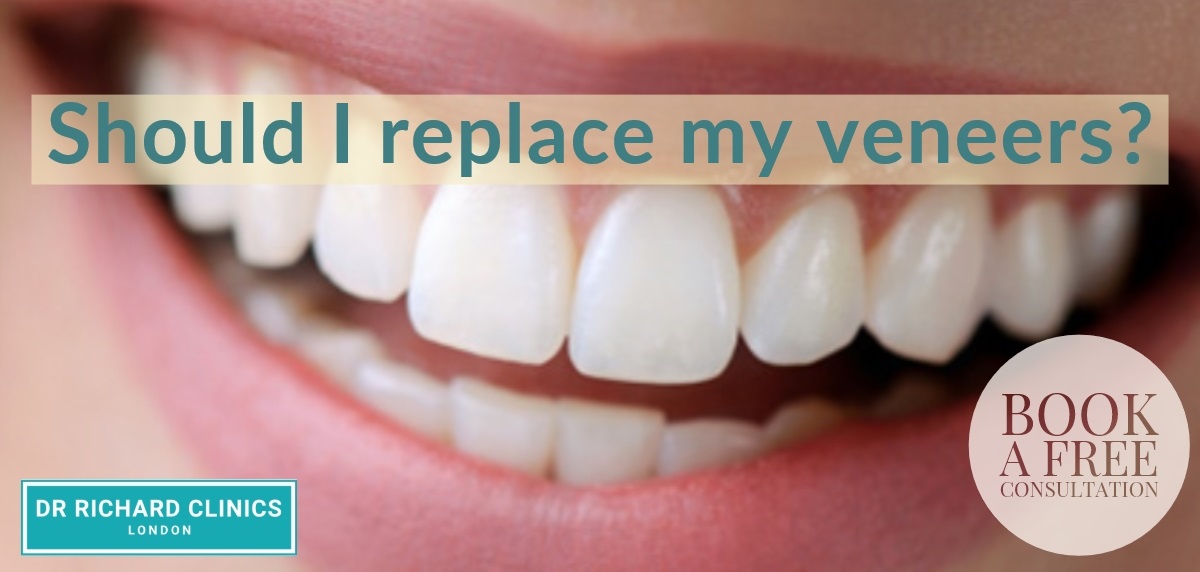Insightful and informative dentist blog, covering a wide range of dental topics alongside new treatment & clinic announcements.

Should I replace my veneers?
Sadly, veneers won’t last a lifetime – your old veneers will eventually wear out and need replacing so you can once again smile with confidence. But there are also other factors to take into consideration. As modern dental methods and materials improve, it could be worth replacing veneers in order to fit better ones, even if they haven’t come to the end of their natural life.
In this blog, we’ll explore the lifetime of veneers and the different reasons why you might want to replace them.
How long do veneers last?
There are two types of veneers, porcelain and no-prep, which have different lifespans.
To fit porcelain veneers, a layer of your natural tooth will be thinned and reshaped, with the veneers moulded and fitted to it, forming a strong bond. As porcelain is a strong material and the bond a strong one, it is likely that these veneers will last for 10-15 years or even longer – some of our patients say they’ve had theirs for more than 20 years.
No-prep veneers are made out of composite resin and, as their name suggests, no preparation work needs to be done on the tooth surface. However, this means these dental veneers need to be very thin with the result that they last less long than the more robust porcelain veneers – around 5-7 years. The good news is that if you decide you don’t want replacement veneers, they can simply be removed; whereas porcelain veneers are a lifetime’s commitment.
If you’ve had your porcelain or no-prep veneers for longer than their expected lifetime, this is a good time to think about replacing them.
Bulky or ill-fitting veneers
Here at Dr Richard Clinics, we often see patients with dental veneers that are bulky or badly fitted which makes them self-conscious about their smile. Even though the veneers are strong and functional, our patients want to replace them with the latest veneers that are thinner which will result in a much more natural look. To do this, veneers need to be custom-made. We always take a mould of your mouth to ensure that the veneers fit precisely to the shape of your gum line and each individual tooth.
We recently replaced TV presenter Rylan Clark’s self-proclaimed “infamous veneers” after he decided to make them flatter, smaller and more discreet than they had been before. He was more than happy to show off the process of his replacement smile with us to give you an idea of what the treatment involves.
Chipped, cracked or discoloured veneers
Porcelain is pretty hardwearing, but it can become cracked or chipped, particularly if you don’t follow good dental hygiene or they’ve been poorly fitted. It’s good to know that damaging veneers, especially porcelain veneers, is relatively rare, though there are a number of ways they can be chipped or cracked: through biting down on hard foods (especially if you eat them on a regular basis), through persistent teeth grinding, or through an injury to your teeth. Once you damage your veneers, they will need to be replaced in order to protect the underlying teeth.
If you’re a smoker or a vaper, then it’s important to understand that tobacco reduces the flow of blood to your gums, weakening your teeth and gums and making them more prone to disease which will affect the stability of your existing veneers. Tobacco smoke may also weaken the bond between the underlying teeth and your veneers. Porcelain veneers are resistant to discolouration, but if you are a heavy smoker, prolonged exposure to nicotine and smoke will eventually discolour them, spoiling their appearance. Fitting replacement veneers could therefore be a great excuse for giving up smoking and/or vaping!
Veneers separating from the tooth or gum
You should definitely seek advice from a dentist if your veneers have begun to separate from your tooth or there is a gap at your gums, as this could be a sign of tooth decay behind the veneer, or of gum disease, possibly as the result of poor dental hygiene.
It is also possible that the veneer will ‘debond’ from the tooth underneath – where the bond degrades and the dental veneers begin to separate from the tooth.
The best ways to make your veneers last a long time
Veneers need looking after in the same way as you look after your natural teeth. Good oral hygiene is key, which means brushing your teeth twice a day with non-abrasive toothpaste and flossing daily to remove any food particles or bacteria that could cause problems. If you take part in contact sports, wear a mouthguard to protect your teeth as well as your veneers. You could also wear a dental guard at night if you have a habit of grinding your teeth in your sleep.
While dental veneers are stain resistant you can never be too careful, so limit your intake of food and drinks that are high in pigmentation, such as coffee, tea, red wine, dark fruit juices, berries, pasta sauce, curries, and sodas. And, of course, give up smoking/vaping.
Regular dental check-ups and visits to the hygienist will also help protect your existing veneers by catching problems early as well as making sure plaque does not have the opportunity to accumulate.
Are you ready to replace your dental veneers?
If you are thinking about replacement veneers, don’t worry, fitting new veneers is a straightforward process. The dentist files down the bonding agent that glued the previous veneers, then takes an impression of your teeth. Once the new veneers are ready, they will be applied to your teeth using the same method as before.At Dr Richard Clinics London, our dentists offer a free consultation to assess your teeth for a range of cosmetic dental procedures, including replacing veneers.